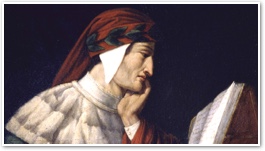Dante Alighieri
- HEATHER KING
Dante Alighieri (1265-1321), Italian poet and moral philosopher, authored "The Divine Comedy".
 His three-part journey through hell, purgatory, and paradise, with the Latin poet Virgil as his guide and the ethereal figure of Beatrice as his muse, is perhaps the greatest work ever written on romantic love.
His three-part journey through hell, purgatory, and paradise, with the Latin poet Virgil as his guide and the ethereal figure of Beatrice as his muse, is perhaps the greatest work ever written on romantic love.
Dante started The Inferno, his description of the journey through the nine circles of hell, in 1307, five years after he was exiled from Florence on politically motivated corruption charges. Apparently, he spent much of his life wandering between Bologna, Padua, and possibly Paris.
Reams have been written about this iconic poem: Dante's innovative jettisoning of Latin in favor of the Italian vernacular, the terse rima that makes translating so fiendishly difficult, the debates over who has remained most faithful to the text: Ciardi? Sayers? Esolen?
What we do know is that the poem was inspired when Dante met his real-life Beatrice on the streets of his native Florence.
In Religion and Love in Dante: The Theology of Romantic Love, Charles Williams describes her effect on him like this:
The heart, where (to him) "the spirit of life" dwelled, exclaimed to him, at that first meeting: "Behold, a god stronger than I, who is to come and rule over me." The brain declared: "Now your beatitude has appeared to you." And the liver (where natural emotions, such as sex, inhabited) said: "O misery! How I shall be disturbed henceforward."
We cannot bypass the experience of hell; and still less can we evade the long struggle of purgatory, through which we come to maturity in love.
If you've ever been in thrall to such a catastrophic attachment, you know you wouldn't wish it on your worst enemy. Part of the beauty of The Divine Comedy is that Dante assures us the experience is essentially religious: part passion, part pathology; half holy fire, half fires of hell.
The Divine Comedy is often described as a journey from sin to redemption. But in Dark Wood to White Rose, Dante scholar Helen M. Luke more rightly casts the journey described in the poem as a pilgrimage to transformed consciousness that at last allows us to know the "love which moves the sun and the other stars":
The man who wrote the last canto of the Paradiso knew that we can never come to this vision by any shortcut. We cannot bypass the experience of hell; and still less can we evade the long struggle of purgatory, through which we come to maturity in love.
To meet the person who makes us feel as if we were simultaneously being brought electrically alive and killed — and to stay the course through the ensuing pilgrimage — is to embark on perhaps the most heroic and most perilous adventure of which a human being is capable.
That is the journey for which we were born, and for which there is no earthly guide, no familiar landmarks.
That is the adventure charted in Dante's masterwork.
Ecce homo — Behold the man — said Pilate as he presented a bound and bloodied Christ. We, too, are called to die for love, standing silently on the pinnacle where suffering and joy meet: consenting to be crucified, holding fast to the Resurrection.
Related Articles

 This is Meaghen Gonzalez, Editor of CERC. I hope you appreciated this piece. We curate these articles especially for believers like you.
This is Meaghen Gonzalez, Editor of CERC. I hope you appreciated this piece. We curate these articles especially for believers like you.
Please show your appreciation by making a $3 donation. CERC is entirely reader supported.

Acknowledgement
 Heather King. "Dante Alighieri." Magnificat (August, 2017) 64-65.
Heather King. "Dante Alighieri." Magnificat (August, 2017) 64-65.
Reprinted with permission from Magnificat.
The Author

 Heather King is a sober alcoholic, an ex-lawyer, a Catholic convert, and a full-time writer. She is the author of: Parched, Redeemed: Stumbling Toward God, Marginal Sanity, and the Peace That Passes All Understanding, Shirt of Flame: A Year with St. Thérèse of Lisieux, Poor Baby, Stripped, Holy Days and Gospel Reflections, and Stumble: Virtue, Vice, and the Space Between. She lives in Los Angeles. Visit her website here.
Heather King is a sober alcoholic, an ex-lawyer, a Catholic convert, and a full-time writer. She is the author of: Parched, Redeemed: Stumbling Toward God, Marginal Sanity, and the Peace That Passes All Understanding, Shirt of Flame: A Year with St. Thérèse of Lisieux, Poor Baby, Stripped, Holy Days and Gospel Reflections, and Stumble: Virtue, Vice, and the Space Between. She lives in Los Angeles. Visit her website here.




